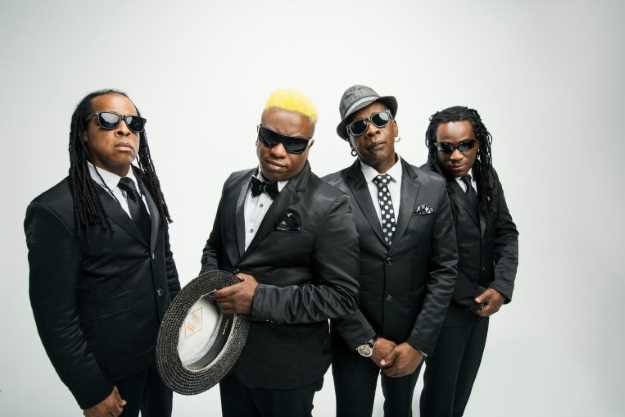|
Taken from Chicago Sun-Times (Sep 01, 2017)
Living Colour takes on many ‘Shades’ in new album
by Selena Fragassi - For the Sun-Times

Living Colour | TRAVIS SHINN |
Behind almost every great album is an important story of how it was made. For Living Colour’s latest, “Shade,” that defining moment came in March 2012 when the New York alt rock-funk-metal fusion act was invited to play the 100th birthday fete of legendary bluesman Robert Johnson, held at Harlem’s famous Apollo Theatre.
“We had been assigned the song ‘Preachin’ Blues,’ but we really didn’t have a chance to rehearse how we were going to do it,” recalls guitarist Vernon Reid. “But there was this moment where [vocalist] Corey [Glover] said ‘let’s put that lyric on top of that riff,’ and we just went out there and did it. It was really electrifying — and slightly terrifying — to just be present in the moment, and I think that was the spark that made us think this album is about the blues. It had to be a part of its DNA.”
The band’s amped up, Hendrix-style cover of Johnson’s “Preachin’ Blues” makes the final cut of “Shade” - due Sept. 8 - as do songs like the traditional modern blues format of “Freedom of Expression (F.O.X.),” soulful New Orleans boogie track “Who’s That” and electric guitar-and-vocal wailer “Two Sides.” There’s also a hair-raising rock take on rapper Notorious B.I.G.’s polarizing hit “Who Shot Ya” and a cover of Marvin Gaye’s “Inner City Blues” that vibrates between down-tempo jazz and hard rock riffs.
All 13 tracks were the result of very calculated moves over the span of five years in the studio by the band (also including drummer Will Calhoun and bassist Doug Wimbish) and long-time producer Andre Betts to explore the thread of the blues in influencing so many stylistic descendants.
“We wanted to target this tradition that really informs so much of the way I hear music, and certainly how the band approaches it,” Reid says, describing his enthusiasm, as a heavy rock guitarist, for jumping into different territory like slide guitar. But music was only one ingredient; Reid notes the other important element for “Shade” was presenting a cohesive story. “One thing I held to with the album, even though we’re in such a non-linear age of downloads, was the idea that front to back it had to tell a narrative,” he says. “It had to feel like there was a conversation going on.”
Living Colour has never shied away from adding to important societal discourse through music, especially being one of the only all-black heavy rock bands in the ‘80s to have primetime exposure. Almost 30 years ago, with the help of early champion Mick Jagger, they first made waves with their breakthrough single, “Cult of Personality,” a dynamo piece of work featuring searing riffs from Reid and the melodic vocal honey of Glover while also making a statement under the covers. Sampling from a speech by Malcolm X and the Inaugural Addresses of both Franklin Dr. Roosevelt (in 1933) and that of John F. Kennedy (in 1961), the song (and its title) define the complex psychology and mass media paradigm behind modern politics.
Three decades later, “Cult of Personality” is just as relevant in 2017, though Reid says there was plenty more ground to cover on “Shade,” the band’s first album in a very defining eight-year period.
“It’s strange, this record was started when Barack Obama was still our president, and in a weird way — because of the results of [last year’s presidential] election—a lot of things we say in the record became very much a real-time dialogue,” says Reid, giving an example with “Two Sides,” the last song on the album. “In the lyrics when Corey says, ‘nostalgia for things that never happened,’ unintentionally that’s kind of directed back at Make America Great Again, which in its fantasy whitewashes our actual history. There is a lot of backwards masking of the past, which is why when we talk about two sides of any story, it’s more poignant than ever now.”
The decision to also include the cover of “Who Shot Ya” (which first appeared on an EP last fall) was a reaction to the rampant gun violence in America.
“We are at a complete crisis over guns and we’re very incoherent on how to discuss it,” Reid says, explaining that the band invited several guest MCs including Chuck D and Black Thought of The Roots in order to “speak about gun violence from various points of view.”
There’s also the popular single “Program,” analyzing what Reid calls our post-“1984” world. “We’re living that reality, we’re willingly clicking on the things that have us tracked, but we are also partially responsible for programming it,” he says. “And now it’s, how do we deal with it?”
Much like the tradition of the blues, vocalizing the strife is one powerful way forward, as the title of “Shade” likewise suggests. “To me, there seems to be a shadow cast across our collective lives,” Reid has said. “We can either allow it to oppress us or we can shine a light on it.”
|